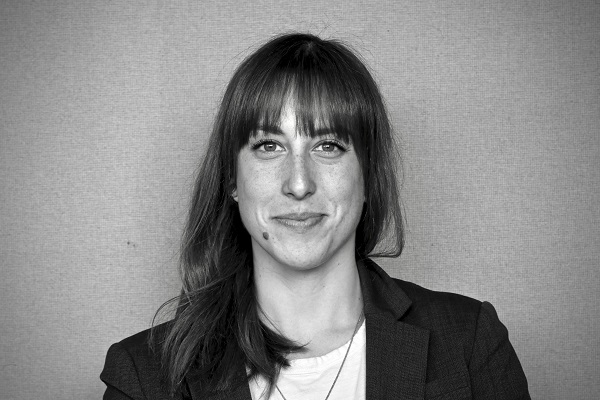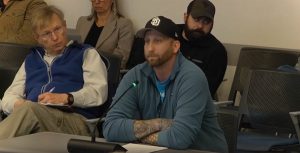As demand increases for sexual assault support services, SASS grows its community of care
8 min read
Sexual Assault Support Services moves to a new larger office at 19th and Jefferson, diagonal from the old location. According to the executive director, the new space will help meet growing demand. In the past year alone, overall demand for services increased 140%.
[00:00:20] SASS Executive Director Martina Shabram: There’s two ways to interpret a kind of increase in need, right? One is to say, well, maybe there’s an increase in need because there’s an increase in violence. But, you know, because of the very low rate of people who experience violence and then report it, it’s really hard to get an actual gauge of how much violence is occurring in a community at any given time.
[00:00:40] So we can’t really say, is violence increasing or not? That’s not a question we can answer, right? So the other way to interpret that is to say that there are more people who are aware that they are deserving of care, and they know where to receive that care, and they’re reaching out for that care.
[00:00:55] And that’s really how I choose to see that information, right? I really think about that as a really good indication that people are accessing the support that they need and deserve more often. And I’m really glad about that.
[00:01:10] John Q: SASS manages a hotline that is available 24 hours a day.
[00:01:14] Martina Shabram: That is a 24-7 crisis and support hotline, and the number for that is 541-343-7277 or 844-404-7700. So just like the name implies, it is 24-7-365: We never close. And it really is there for crisis and support.
[00:01:38] So some folks call in the acute aftermath of a traumatic crisis, and some folks call because they are trauma survivors, maybe even trauma survivors whose experience of trauma happened decades in the past, but who need some support in their healing journey.
[00:01:53] People call who are in community with survivors. So families, friends, and loved ones of people who’ve experienced sexual violence are also welcome to reach out for our services.
[00:02:03] And really importantly, we serve folks of all genders. So sexual violence is often treated as a ‘women’s issue,’ but we know that people of all genders can and do experience sexual violence. And this is a space that we really make the effort to make safe for folks of all gender identities, for trans folks, for queer folks, for men, for women.
[00:02:23] We serve folks who are roughly 15 years old and older for almost all of our services; there are some age limits for our support groups. And we offer services in all languages. So we have tele-interpretation available 24-7, and we also have both English and Spanish live. So we have bilingual/bicultural staff members and offer a specific program that is meant to do outreach to the Latinx community. So people can call that crisis line and any time of the day or night receive that 100% confidential support.
[00:02:55] John Q: Community members can support SASS in a variety of ways.
[00:03:01] Martina Shabram: So we are a 501(c)(3), a nonprofit. We’ve been around since 1991, so we’re up, you know, old and established. We are primarily funded through grants and some contracts that we also have. But, my gosh, when community members are able to support us financially, that is also such an incredible gift, because that money is much more flexible than something like a government grant fund, right, which has a lot more rules and restrictions—for very good reasons. But it’s always really amazing when we have donations because we can use those really to directly influence the immediate needs of survivors, no matter what those are.
[00:03:37] And we receive community support also through people who are interested in volunteering. Our volunteer program is a little different from some other places, because, again, of the high degree of confidentiality that the people we serve require.
[00:03:51] So because of our funding structure and because of the services that we provide, we are all what’s called ‘privileged advocates.’ So we have advocacy privilege, which is even more strict than something like HIPAA. So we are prohibited from disclosing any information about our clients to anyone, and that includes minors.
[00:04:12] So we’re not mandated reporters, and that means that young folks can come and talk to us without having the risk of a report, potentially. And that’s really important because there are not a lot of places that people can go to seek the support that they deserve without maybe having that little bit of fear.
[00:04:28] And there are a lot of people who will choose not to disclose and not to seek out support because it doesn’t feel safe to risk the possibility of reporting. So that’s an important piece, but that also means that to volunteer with us, people really do have to go through a substantial amount of training and then become a privileged advocate, which they do through our training program.
[00:04:49] So people who want to volunteer typically do that in direct client service. So we have folks who volunteer on our crisis line and folks who volunteer doing our 24-7 medical advocacy in emergency rooms. So, kind of like a high level of training required for that, and really a commitment that not everybody can or wants to make.
[00:05:10] But those who are interested can absolutely go to our website. It’s www.sass-lane.org. There is an application button there. We also have internship opportunities. And there’s a little bit of an interview process for applying to be a volunteer. And so folks can kind of gauge through that, like, oh, is this actually right for me? And figure out what is the best way for them to connect with survivors in our community or to connect with us.
[00:05:36] John Q: Martina said SASS operates as a community of care, supporting those who receive care as well as their caregivers.
[00:05:42] Martina Shabram: There’s a high trauma burden to doing this work, so we really approach the process of building a community of care around supporting not only the survivors in our community who seek services, but also supporting the people in our community who offer those services.
[00:05:59] So, we really take the mental health of our staff and our volunteers really seriously and really try to ensure that we’re caring for one another in a really distinct way. But when people are really able to get the support that they need to offer this support, it really is one of the most fulfilling forms of care that a person can offer, to just witness and be in solidarity with someone, at perhaps one of the worst days of their life.
[00:06:25] It is like our deep and profound honor to be able to be there with folks in those moments.
[00:06:28] John Q: Martina said the work is not easy.
[00:06:30] Dealing with the vicarious trauma that a person experiences when they are in community with people who are experiencing trauma is—I mean, vicarious trauma is no less real than any other form of trauma. It affects the brain and the body in the same way. And holding the pain and trauma that others are experiencing and just being there and witnessing it, that is hard.
[00:06:49] So we approach that through a variety of sort of strategies. The first is that we have what we call a community of care model, and that means that we are all collectively caring for our community, which means the survivors we work with, and each other, and ourselves.
[00:07:06] We typically do a sort of weekly debrief where all staff and any volunteers who are able and would like to participate, are able to share what they’ve experienced that week on the lines or with clients and receive the support they need.
[00:07:20] And when folks are feeling like maybe they’ve taken on a little bit more than they can currently hold, then they can pass back to the rest of the group what they don’t have the capacity for anymore. We really trust folks to be doing the introspective work to determine what their level of capacity is.
[00:07:35] And one of the really unique things about the work we do is that we can never predict what a shift is going to be like. Right? We have had weeks where one staff member will, by the luck of the draw, take in the majority of the client contacts of that week, and another staff member or volunteer has had zero, even if they’ve had more time on the lines, right?
[00:07:57] So we really make those determinations based on what people say they need. And for our employees, we have a really, really robust series of supports that include a really wonderful time-off policy, paid time off, and also some other sort of ways that we have, or methods that we have used, to ensure that people are getting the care they need, including support for taking mental health breaks and things like that.
[00:08:22] What it means to do care work is really important to us. SASS is an agency that is explicitly engaged in liberation. So we are an anti-oppression organization and we understand that sexual violence is a core component of systemic oppression, and that systemic oppression creates the conditions in which sexual violence can occur.
And so, if we’re going to end sexual violence, which of course is our core goal, we have to be committed to really dismantling all forms of systemic oppression. And that means also looking at ourselves and asking: In what ways are we, as an organization, contributing to forms of oppression?
[00:08:59] You know, capitalism is inherently oppressive, so how can we dismantle some of those systems while still being inherently tied to them? Those are questions that we think so much about at SASS.
[00:09:10] John Q: The next volunteer training is coming up this spring.
[00:09:14] Martina Shabram: So for folks who are interested in volunteering for something like crisis line support, the training is about 40 hours. Fortunately, because of the adjusting to the pandemic, we now offer that in a sort of hybrid in-person and online version, which I think is a lot more accessible to a lot of folks.
[00:09:33] So there is an online module that people go through and then some in-person training scenarios, and then there’s shadowing, so nobody ever steps into a crisis situation without first receiving a lot of support. And that’s both to protect the people we’re serving and also, as I’ve said already, to protect the mental health and safety of the people who are offering that care.
[00:09:57] The website is www.sass-lane.org. So: Sexual Assault Support Services, SASS, Lane like Lane County, right?
[00:10:07] So again, if folks are interested, we run trainings roughly quarterly. We’re looking towards the early spring for that. So likely the beginning of March is when we’ll have our next round, but folks can apply anytime and can learn more about what that looks like and can get started on the road to being a crisis line advocate.
[00:10:26] John Q: SASS has a new home at 19th and Jefferson.






